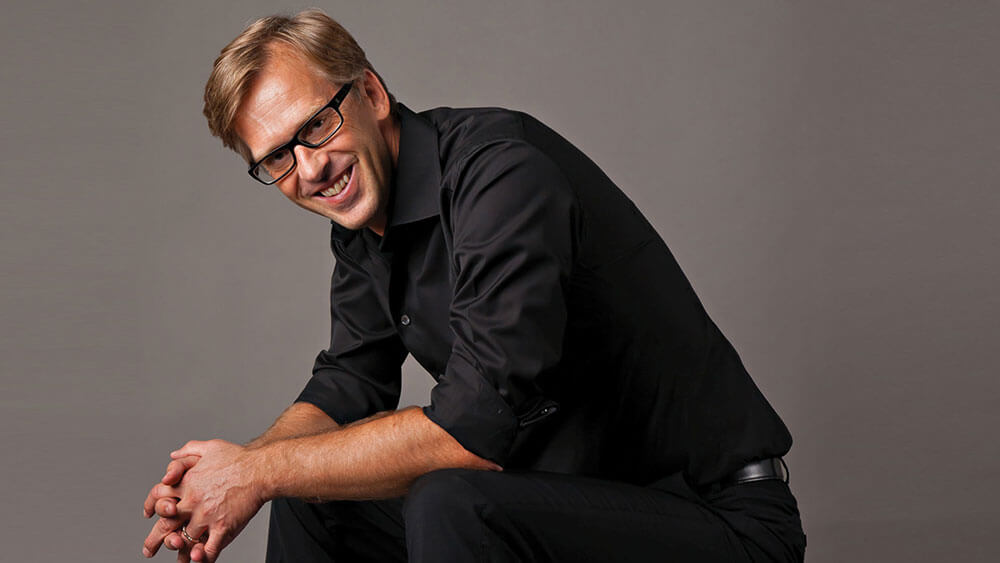
Fredrik Härén will give the keynote address on creativity Sept. 24 at PCMA’s European Influencers Summit in Barcelona. (Courtesy Fredrik Härén)
Many workers only now may be waking up to the fact that creativity is one of the job skills that could help keep humans at work and the robots at bay. But Fredrik Härén has been speaking about creativity as the source of ideas — and why that matters in the work world — for nearly a quarter of a century.
“We have this mystical idea about creativity like it’s something magical that just pops into your head,” Härén said at the 2017 Global Leadership Summit. But the definition of creativity, he said, is one person taking two formerly known things — or taking knowledge and information — and combining them in a new way. “It is not magical. It is easy.”
A Swede living in Singapore, Härén is the author of 10 books, including The Idea Book, which Time included in its “The 100 Best Business Books of All Time.”
He spoke with Convene in advance of his keynote at PCMA’s European Influencers Summit, Sept. 22–24, in Barcelona, where he will explore “The Role of Creativity in a Rapidly Changing World.”
Over the years — since 1995 — that you’ve spoken about creativity and its importance in businesses and organizations, what’s changed?
It’s always been about creativity and change. But when I started speaking straight out of university, I was 27 and first I was also a speaker about the internet. I spoke about this new thing and how we could use that to do business in a new way. Then, from about 2000 to 2005, the theme was innovation. Okay, now we have the internet, so we need to come up with new ways of doing our business. We need to innovate. Then it became, “We can’t innovate because we are not creative enough.” So we needed to really develop our creativity. Then, starting in about 2005, it became digital transformation. It’s not enough for us to be creative: We need to transform our business. And for the last five years or so, it’s been disruption.
But with the current sense of urgency — the urgency has never been even close to what it is today — creativity is much more of a crucial topic to speak of now than in the 25 years I’ve been doing it.
What spurs your creativity as an author?
I write my books about what I’m interested in at the moment, basically what I see. I wrote a book [The Developing World] about the creativity that would be coming from China. But in 2007, people were literally laughing at me when I was writing the book. Now, no one is laughing at the idea that China can innovate — because they are innovating like crazy.
The book I’m writing right now is called The World of Creativity and that book is about how there are different sides of human creativity. Just like sides of food, like Japanese food and Italian food, there’s also Chinese creativity and Thai creativity and they’re all different.
For example?
I just came back from giving a speech in North Korea. I learned about North Korea creativity, which is very, very different from any other creativity.
What was the biggest surprise there?
Oh, many surprises. From an event perspective, I’ve never had more advanced questions from an audience — like super advanced, detailed questions. And afterward, they were literally sitting for 30 minutes and writing page after page after page of feedback. I’ve never seen that happen.
And their approach to creativity is one plus one equals big one — which means they don’t look at creativity as something individual. They look at creativity as a collective. It’s like an orchestra. You don’t have a star. We would focus on the solo, and they would focus on the music of the orchestra. Totally different.
What kind of takeaways do you want attendees in Barcelona to go home with?
Someone once called me “an inspirational kick in the butt.” And I think that’s the best review I’ve ever gotten. That’s what I aim for.
If you break down “inspirational kick in the butt,” the inspire [part] is to breathe in and get new oxygen, new ideas, new inspirations, new input. And the kick in the butt is not a kick in the face, a kick in the butt is actually something that pushes you forward to do something. An action. Say, get off of the couch and go out running.
I’m not the guy who says, “this is how AI is going to change your business.” I’m not doing that. They have to come up with the ideas. I have to get them to find that idea for themselves, whatever that idea may be.
You talk to a lot of groups. How are you going to gear your talk to this business events industry audience?
I won’t go in and say, “this is how the industry is changing.” Because I don’t do that for anyone. But I was extremely excited to come and speak because I do know something about the industry. So for once I’m coming to the industry as an expert.
I’m not seeing this as just another speech — to me I feel like I’m coming home. Most speakers don’t start straight out of university, right? Most speakers do something and then they become speakers. But this is my industry. It’s been my industry since … you name it. It’s the one that I know.
This interview has been edited for length and clarity. Cristi Kempf is executive editor at Convene.
